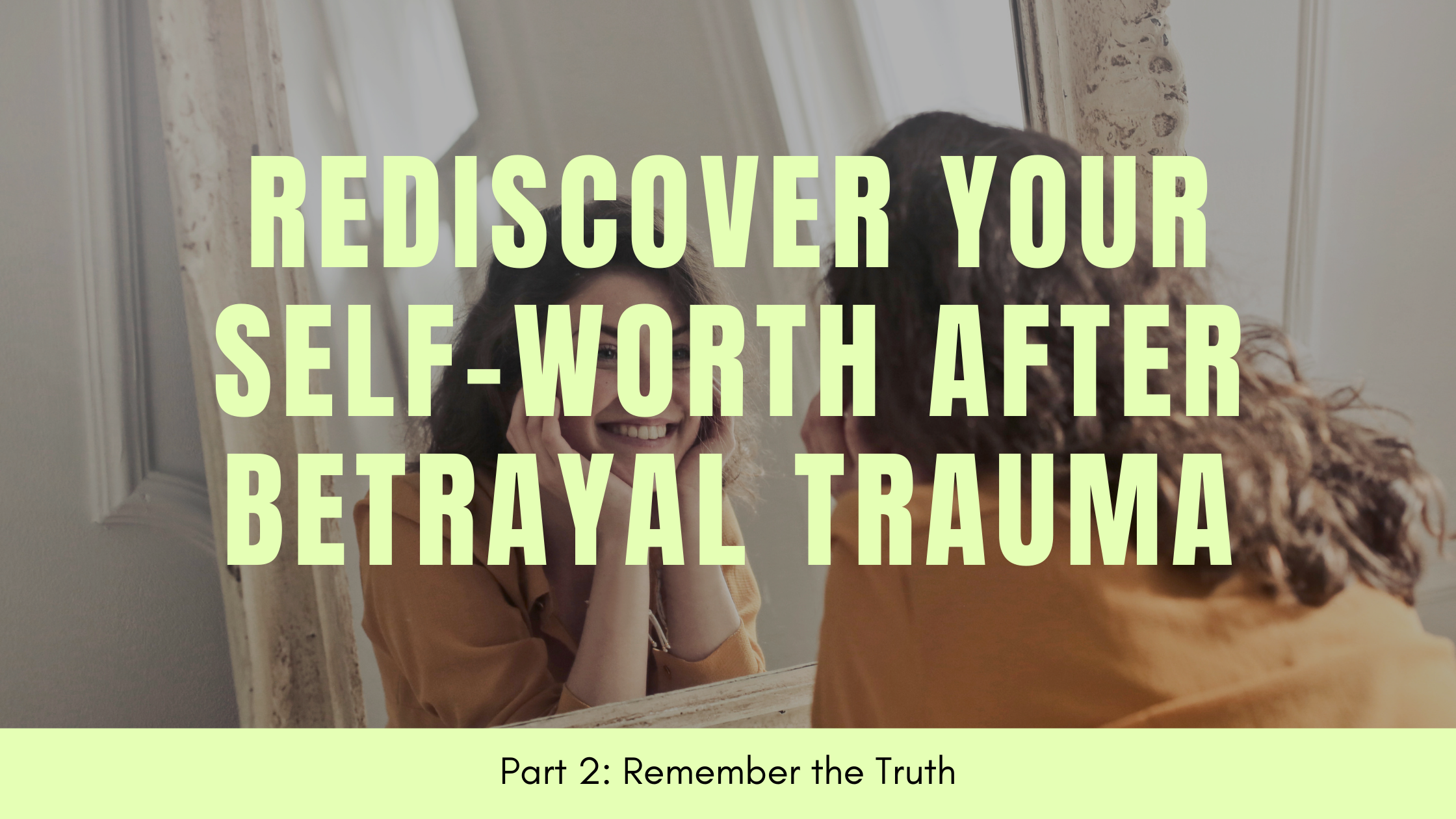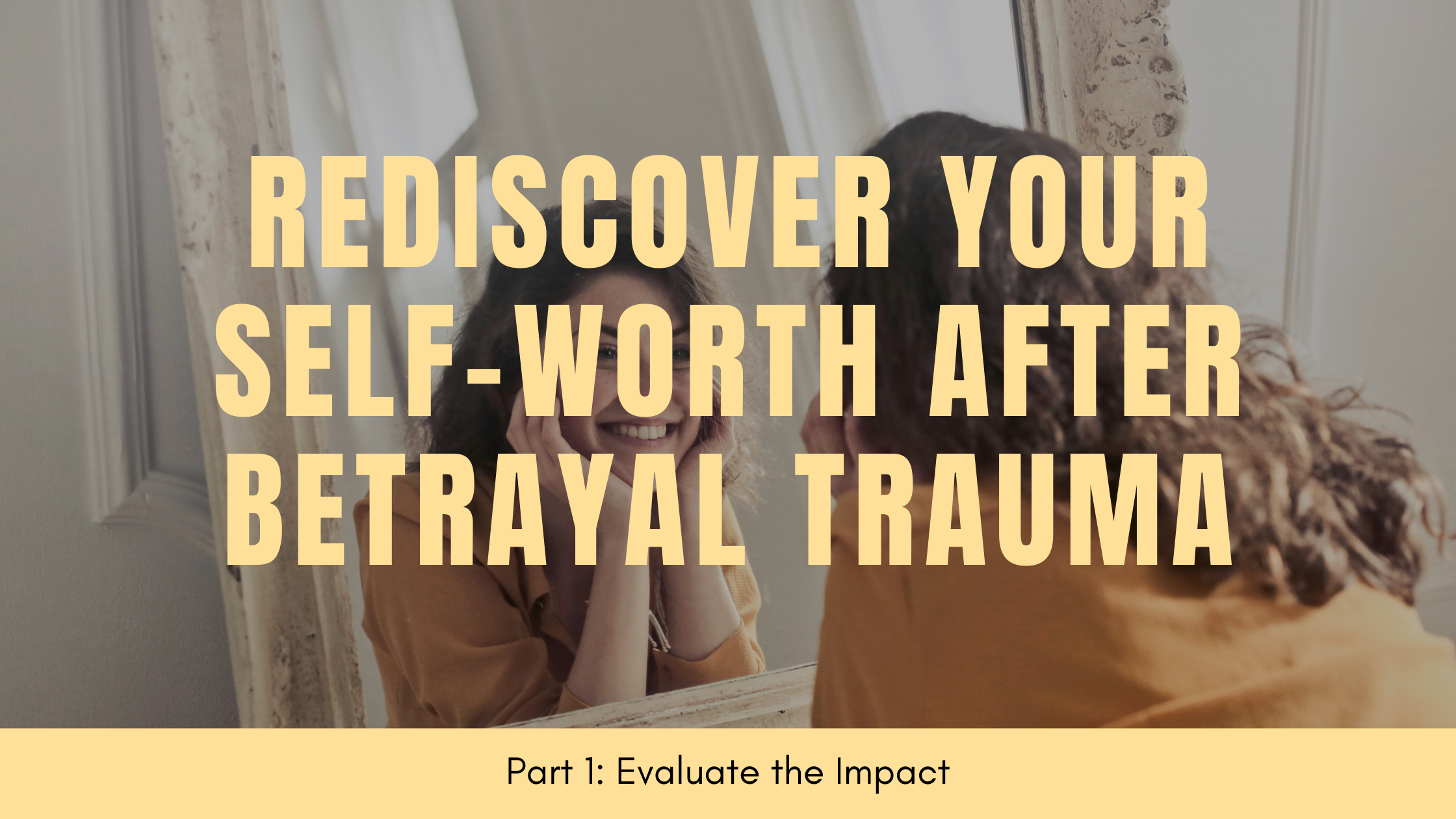When you’ve recognized the impact of your partner’s sex and love addiction on your sense of self-worth, it can be a challenge to identify how to break out of that trap. You may feel stuck or powerless to change. Your emotional landscape or confusing thoughts may make it difficult for the truth about your inherent worth and value to sink in.
We built the foundation of understanding the impact of betrayal trauma on self-worth by evaluating symptoms in Part 1 and reviewing reminders of what is true in Part 2. Understanding the truth about addiction and trauma may be reassuring intellectually. But understanding might not change the way you feel, which is a major component of insecurity around your self-worth. Today, we’ll explore how these insights can influence your behaviors such that your feelings of confidence begin to grow.
Acting “as if” as a pathway out of low self-worth
If you believed that your worth was inherent and not based on what others think of you, how might that change the way you interact with others? If you believed that it was impossible to be “enough” for the addiction, how might that influence the way you relate to your spouse? How might that create space for more self-care and boundaries? As you answer these questions, begin to experiment with taking different actions that fit those changes in beliefs.
Here are a few examples of potential applications if you acted “as if” these statements were true:
Attend a 12 Step meeting or support group.
If you believe that you are worth spending time with, it makes sense for you to reach out for social support. Finding a safe place to talk about your doubts and hear others’ stories helps you know that you are not alone. Outside help will both validate you and challenge you when needed.
Begin personal counseling.
When you come to realize that the only person you can control is yourself and that you are worth caring for, you will be more likely to seek out professional help on how to do that. You have a right to receive support and care in the process of moving through the trauma. Seeking out specialized counseling is a way to honor that right.
Release the burden of perfectionism.
If you’ve coped with feelings of failure or insecurity in the past by trying to keep your life together and be perfect, you might find the same patterns surfacing in your betrayal trauma recovery. Remember that your worth is not defined by how much you accomplish, by your status, or by your achievements. Know that your worth is inherent and allows yourself to take a rest or ask for help.
Put your own needs first by practicing self-care.
Practice kindness toward yourself by recognizing the impact of the trauma of discovery and honoring your needs as a result. Treat yourself how you would treat a friend if they were going through something similar. Recognize your needs that aren’t being met and seek out healthy ways to meet them.
For many, self-care can be challenging because it contradicts beliefs that encourage you to put others before yourself. However, in this case, re-centering on meeting your personal needs is necessary so that you can come into a place of serving and loving your family, spouse, and others more holistically in the future. You can’t serve others from an empty shell of yourself. You have to put on your own oxygen mask before you can help others.
Review your “bill of rights” and set healthy, supportive boundaries that affirm your worth.
In the fog that comes after discovery, you might be unclear about how to achieve a sense of safety and stability. If you’re doubting your worth, you might not be aware of what you have the right to ask for to create a sense of safety in your marriage. Resources like the “bill of rights” on Vicki Tidwell Palmer’s website, as well as her book Moving Beyond Betrayal, can help you identify what you have the right to ask for and begin to help you on the process of setting boundaries that honor your personal worth and value.
Part of this process is recognizing legitimate rights related to your body. Acknowledging your right to say “no” to physical or sexual intimacy at any point and particularly in the early stages of recovery can honor your sexual self.
Explore your options.
Talk to your spouse about couples counseling or treatment, intensive opportunities, or other steps of support. Seek out resources for legal and financial support if you are considering separating and want to pursue financial independence. Read books and attend seminars on trauma and addiction to learn more about what you might be experiencing. Seek out safe people in your life who can provide support and a listening ear.
Recognize your own patterns of denial.
Did you have a sense that something was off long before you discovered your spouse’s addiction? Were there odd occurrences that you explained away or minimized because the thought that your partner might be an addict was too much to bear? In a relationship without addiction, it makes sense to give your spouse the benefit of the doubt. But when you discover addiction, rediscovering your intuition requires you to shift that pattern.
To better prepare yourself for future deception that may or may not occur, it is important to examine how your denial manifested itself: how did you explain away inconsistencies in behavior and words? How have you taken on more of the blame for yourself rather than allowing the addict to own it? By exploring these thought patterns in yourself, you’ll begin to learn to trust your gut again.
Connect the dots between past trauma and present-day emotional reactions.
Each betrayed partner has a different emotional response to the pain of the trauma. These responses typically relate to your history: wounds from your family-of-origin, painful experiences in romantic relationships, or even trauma or abuse.
Consider how the particular patterns of self-doubt you’re feeling are connected to insecurities that stem from your past. Take the time to unearth longstanding patterns of self-talk that might be contributing to your lowered self-worth. In this process, you may also uncover some dysfunctional patterns in relating that stem from your past experiences and begin to shift the way you connect with others.
Grieve the hurts without being consumed by them.
You will likely experience grief in waves that hit you for a time after the discovery of your partner’s addiction. This grief can feel overwhelming and can lead you to a place of self-pity and hopelessness. It can trigger shame and guilt and lead you further into doubting your self-worth.
When you feel waves of grief threatening to overwhelm you, use that as an opportunity to acknowledge the reality of the circumstances that have contributed to the pain and redirect your attention to self-care and empowerment to change. Accept the reality of what is outside of your control and commit to finding ways you can make changes that fit in alignment with your values.
Recognize that sometimes doubt about self-worth masks the legitimate grief of finding out about the betrayal and having to make decisions about the future. Staying in a place of self-doubt or shame can be a self-protective response, keeping you from having to face the hard realities of what comes next.
List your strengths.
Make a list of strengths you have which can uniquely help you to make it through this process of recovery. If you have trouble writing a list, ask those in your support network, your family, or your friends to name strengths they see in you. Take a strengths-based personality assessment to uncover which qualities of your personality will help you to get through this season. Identify resources or strengths that you are growing and fostering to remind yourself that you have power to change what is within your control.







